Donald Trump’s tax plan could cost U.S. trillions of dollars
- Share via
By the numbers
Welcome to Trail Guide, your daily host through the wilds of the 2016 presidential campaign. It's Monday, Sept. 28, and this is what we're watching:
- That tax policy plan Donald Trump laid out? Experts say it could cost trillions of dollars , Michael Finnegan and James F. Peltz report.
- Carly Fiorina's business record is less of a bright spot, The Times' Seema Mehta, Andrea Chang and Mark Z. Barabak report.
- Asians are set to replace Latinos as the largest immigrant group in the U.S., and that has implications for both the country and the election, according to The Times' Kate Linthicum.
- Bernie Sanders spoke at the University of Chicago's Institute of Politics.
Planned Parenthood is more popular than the GOP
For nearly three months, since videos first surfaced showing Planned Parenthood employees talking about giving organs from aborted fetuses for use in medical research, Republicans have pounded at the women's health group, demanding that the federal government stop funding it.
The result: Americans have a significantly more favorable view of Planned Parenthood than they do of the GOP.
Two polls released Monday -- one by the nonpartisan Pew Research Center, the other from the Wall St. Journal and NBC News -- provide the data.
Americans have a generally favorable image of Planned Parenthood, with 41% viewing the group favorably and 31% unfavorably, the NBC/Wall St. Journal poll found. Planned Parenthood's image has actually gotten slightly more favorable since the controversy began, the poll found, although the shift from a poll in July was within the survey's margin of error of plus or minus 3.1 percentage points.
By contrast, only 29% of Americans have a favorable view of the Republican Party, with 45% viewing the GOP unfavorably.
Nor have American attitudes toward abortion changed significantly. Overall, 51% say abortions should be legal in all or most cases, and 43% say they should be illegal in all or most cases, the Pew poll found. That's about where opinion has stood since the mid-1990s.
Asked whether the government should cut off funds for Planned Parenthood, as conservatives have demanded, large majorities of Americans say no. In the NBC/WSJ poll, Americans opposed a cutoff of funds by 61% to 35%. In the Pew poll, a similar majority, 60% to 32% said any federal budget agreement must include money for the group.
The federal government provides money to Planned Parenthood for a wide variety of women's healthcare procedures, but not for abortions, which the government pays for only in case of rape or incest, or to save a mother's life.
The problem for the Republican leadership in Congress: Their party's voters disagree with the rest of the country on the issue.
Among self-identified Republicans, a majority in both polls supported cutting off federal funds for Planned Parenthood. And conservative Republicans, who dominate party primaries, were even more lopsided in their view. By 78% to 16% in the Pew survey, conservative Republicans said any federal budget must cut off money to Planned Parenthood.
Experts say Trump's tax plan could cost U.S. trillions
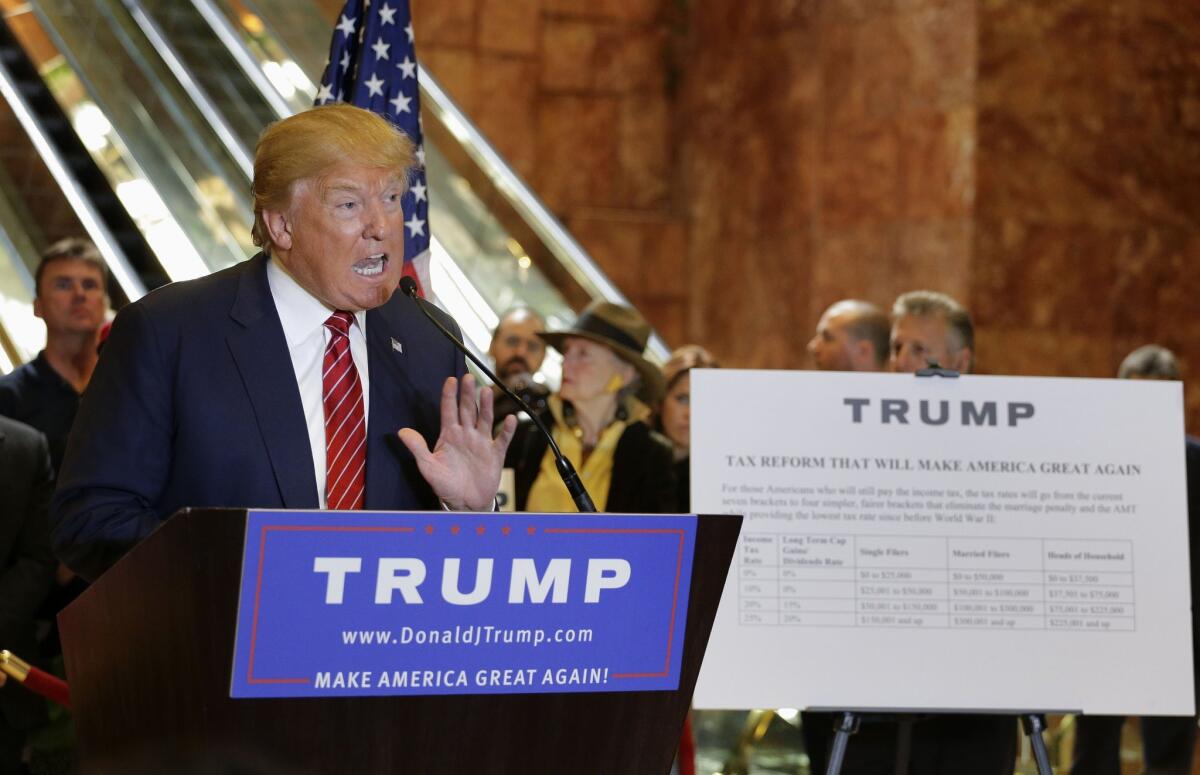
Republican presidential candidate Donald Trump talks about his tax plan in New York.
Republican presidential front-runner Donald Trump proposed a major package of tax cuts on Monday, but offered few specifics on how to pay for them -- and experts predicted they would cost untold trillions of dollars.
Trump, who has faced pressure to offer a detailed campaign agenda, vowed to simplify the tax system, with four individual income tax brackets: 25%, 20%, 10% and 0%. The highest of the seven current brackets is 39.6%.
Trump would also lower the 35% corporate rate to 15%. But businesses would lose tax breaks on earnings overseas and various unidentified "loopholes that cater to special interests."
How his plan would accomplish any of his predictions remains murky.
Tax experts said it would cost the government trillions of dollars in lost revenue. How many trillions is unknown, they said, because of Trump's lack of detail on which tax breaks he would wipe out.
Fiorina dialing California voters on abortion measure
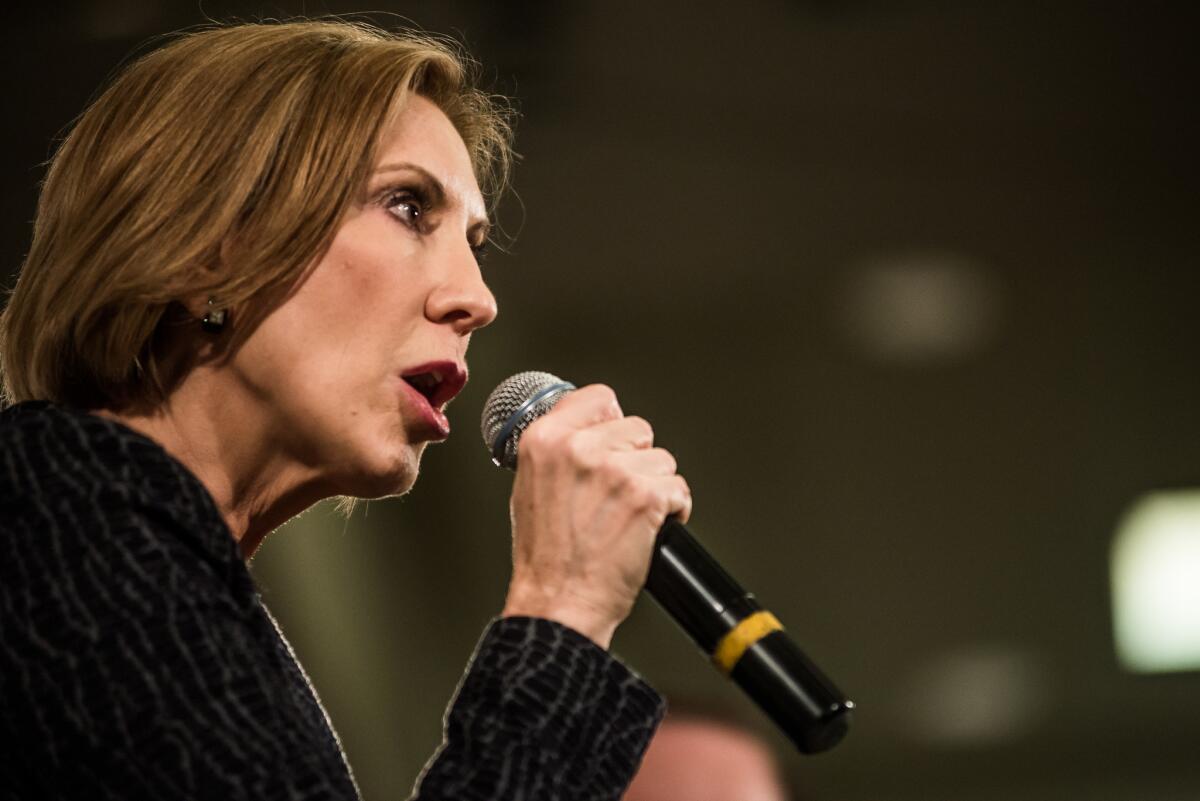
Republican presidential candidate Carly Fiorina speaks at a town hall meeting Tuesday in South Carolina.
Columnist Cathleen Decker got a robocall over the weekend from Carly Fiorina related to an initiative to require parental notification for underage abortions. The call asked respondents to hit a button to get a petition. Fiorina says on the call it's not about being "pro-life" or "pro-choice," but about protecting girls' lives.
In both her 2010 Senate run and her presidential campaign, Fiorina opposed abortions under most conditions. In 2010, she supported the use of federal funds on research using discarded embryos; this year she has led opposition to Planned Parenthood's dissemination to researchers of embryos after abortion.
The call might be a reference to a measure currently collecting signatures for the ballot that would amend the California Constitution to require parents or a legal guardian of a girl under the age of 18 to be notified in writing before an abortion could be performed, according to the secretary of state's website.
A group known as Californians for Parental Rights is urging support for a petition for what appears to be the same measure. People posted about a robocall on its Facebook page, but there was not any mention of Fiorina. An email sent to the group's website was not returned.
Sign up here to get Essential Politics in your inbox daily. And keep an eye on our new politics page throughout the day for the latest and greatest.
Hillary Clinton calls out pharmaceutical CEO to lower drug cost
Hillary Rodham Clinton used a Facebook chat Monday to challenge a pharmaceutical executive to lower the cost of a key drug.
Answering a question about the cost of prescription drugs during her online Q&A, Clinton called out the CEO of Turing Pharmaceuticals by name, a week after he was at the center of an uproar over increasing the cost of a drug for AIDS patients by 5,000%.
Under pressure, the CEO, Martin Shkreli, announced later that the company would lower the price "to a point that is more affordable" and that would still allow Turing to make "a very small profit." He stopped short of restoring the drug to its original cost.
"So Mr. Shkreli, what's it going to be? Do the right thing. Lower the cost today to its original price," Clinton demanded.
Over a pair of responses to drug-related questions, Clinton touted her recently unveiled prescription drug cost plan, which includes a proposal to cap monthly and annual out-of-pocket health costs and to speed up the approval of generic drugs.
Her plan and the Turing example were also featured in a new Clinton ad that the campaign unveiled separately Monday:
Clinton's Facebook chat, the second she's conducted in the campaign, included other policy points and, of course, some lighter moments. She noted the weekend celebration her family had for her granddaughter Charlotte's first birthday -- including her "first taste of cake."
"Are you a pumpkin spice latte kind of gal?" another Facebook user asked.
"The true answer is I used to be until I saw how many calories are in them," answered "-H."
Rand Paul fires up Senate fundraising
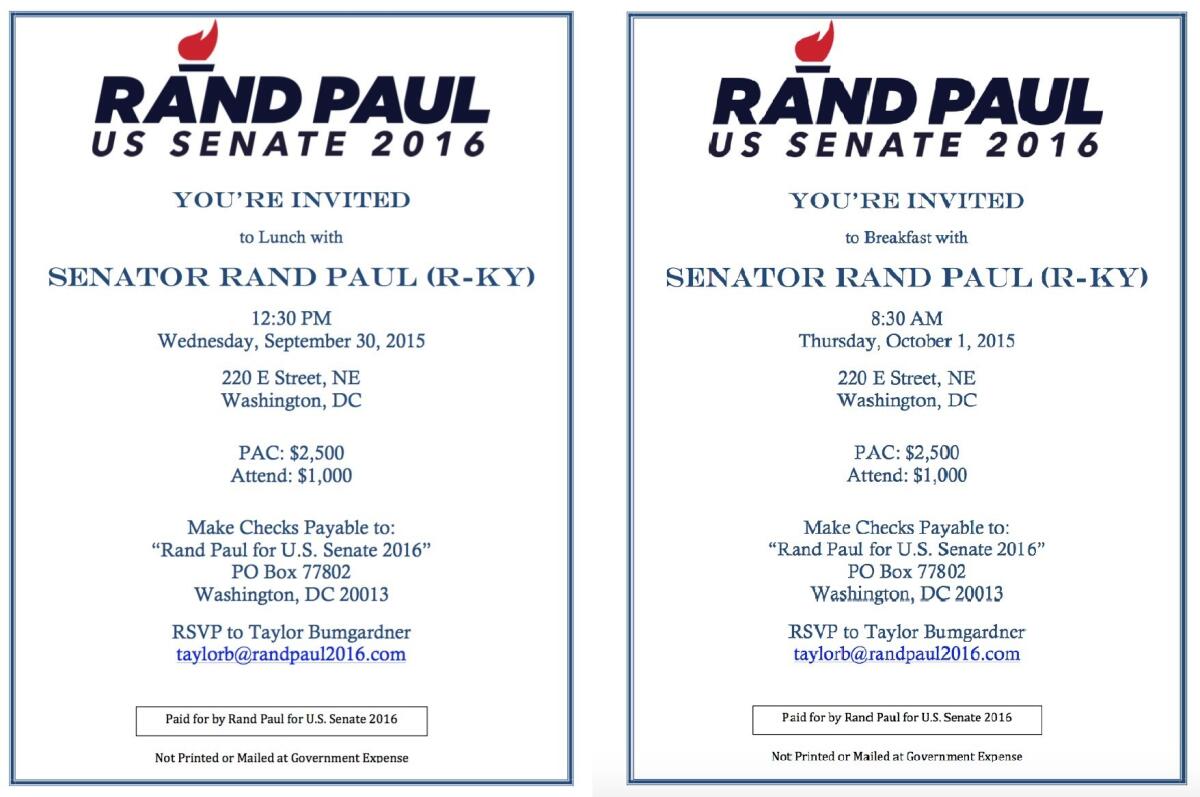
Rand Paul is planning two fundraisers for his Senate campaign this week.
Rand Paul is planning two fundraisers for his Senate campaign this week, according to invitations for the events. A focus on his Senate reelection effort could be a sign that he is winding down his presidential campaign as he struggles to draw meaningful support in the polls in the crowded field.
Paul, a libertarian-leaning Republican, was polling at or near 10% in the spring, when he announced his run for president, but has steadily declined since and has drawn 2%-3% support in recent weeks. As all the GOP candidates did, Paul lost ground to front-runner Donald Trump over the summer, and he has yet to regain his footing.
To be sure, Senate campaign fundraisers are hardly a death knell for a White House run. The deadline for disclosing fundraising totals for Senate and presidential campaigns is this week, and that usually triggers a flurry of solicitations to donors. And Paul's presidential campaign is still announcing endorsements, and he appeared in the early-nominating states of New Hampshire and South Carolina last week.
However, lack of popular support can turn into questions from donors, and without funding, it quickly becomes impossible to continue a run for president. Just ask Scott Walker.
Trump tax plan: Rates as low as 0%; taxpayers can tell the IRS 'I win'
Facing pressure to offer a detailed campaign agenda, Republican presidential front-runner Donald Trump released a plan Monday to overhaul the federal tax system, slashing rates while eliminating some deductions and loopholes.
Trump vowed to simplify the system with four individual income tax brackets: 25%, 20%, 10% and 0%. The corporate income tax rate would be cut to 15%, from rates as high as 35%, but businesses would lose tax breaks on earnings overseas and unspecified "loopholes that cater to special interests."
Trump pledged to maintain personal income tax deductions for mortgage interest payments and charitable contributions.
He also said individuals who earn less than $25,000 a year, or couples who make less than $50,000, would pay no income tax. That would cover nearly 75 million households, he said. Those taxpayers would send a one-page form to the Internal Revenue Service stating, in typical Trump fashion: "I win."
The billionaire real estate developer acknowledged that tax rates on the wealthy would drop, but said his plan would be "revenue neutral" for the government and result in a vastly simpler tax code.
"My returns go up to the ceiling and beyond, which is ridiculous," he told reporters at a news conference in front of the lobby escalator of Trump Tower in Manhattan.
Trump's plan also includes elimination of the so-called carried interest tax break that has enabled Wall Street hedge fund titans and private equity investors such as Mitt Romney to pay lower tax rates than the middle class.
Release of Trump's tax proposal came 12 days after a Republican presidential debate in which Trump was notably less detailed on policy than some of his rivals.
Joe Biden invited to first Democratic debate
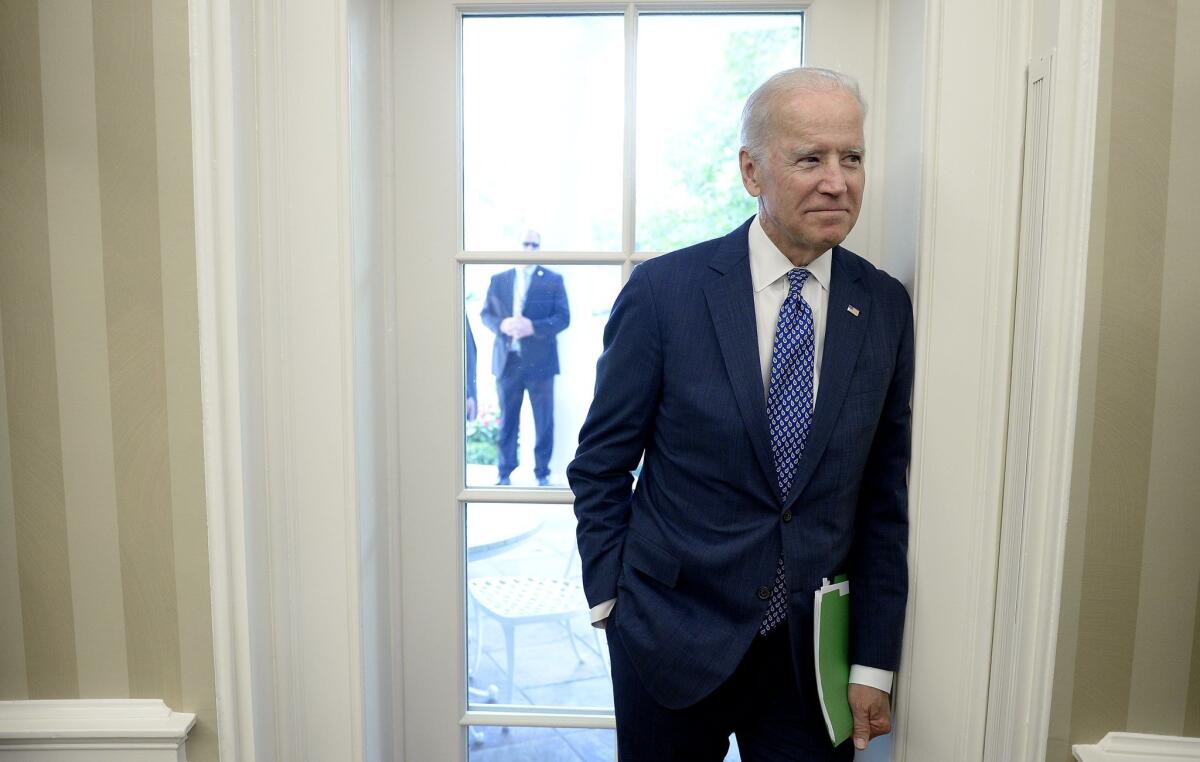
Vice President Joe Biden attends a bilateral meeting in the Oval Office between President Obama and King Salman of Saudi Arabia on Sept. 4, 2015.
CNN is saving a seat for Joe Biden at the first Democratic primary debate.
The cable network announced Monday that the vice president can participate in the Oct. 13 Las Vegas showdown even if he doesn't declare himself to be a candidate until the day of the debate itself.
Besides the fact that he has not formally jumped into the race, Biden meets the other criteria for the first Democratic National Committee-sanctioned presidential primary debate. Any candidate with an average of 1% support in polling recognized by CNN between Aug. 1 and Oct. 10 is eligible.
The five announced Democratic candidates -- Hillary Rodham Clinton, Bernie Sanders, Martin O'Malley, Lincoln Chafee and Jim Webb -- have all been invited, the network announced.
Still, little is known for sure about which way Biden is leaning despite a flurry of speculation over his plans. Last week Biden, a devout Catholic, had a central role as the United States welcomed Pope Francis. Biden saw Francis off from Philadelphia as his six-day trip concluded Sunday.
Another former secretary of State: I wouldn't have approved a private email server
Former Secretary of State Madeleine Albright, who served under President Clinton, said Monday that she wouldn't have allowed staff to use a private email server to do government business, though she cautioned that she does not see Hillary Rodham Clinton's use of one as a security breach.
Albright, a supporter of Clinton's, noted on MSNBC's "Morning Joe" that other State Department officials also had used their own email accounts, and said that government needs to catch up with technological advances.
The email issue has dogged Clinton for months, and several investigations have sprung up. Last week, FBI technicians were said to have recovered some emails that Clinton said had been deleted.
Once again, Carly Fiorina has to answer for her time at the top at Hewlett-Packard
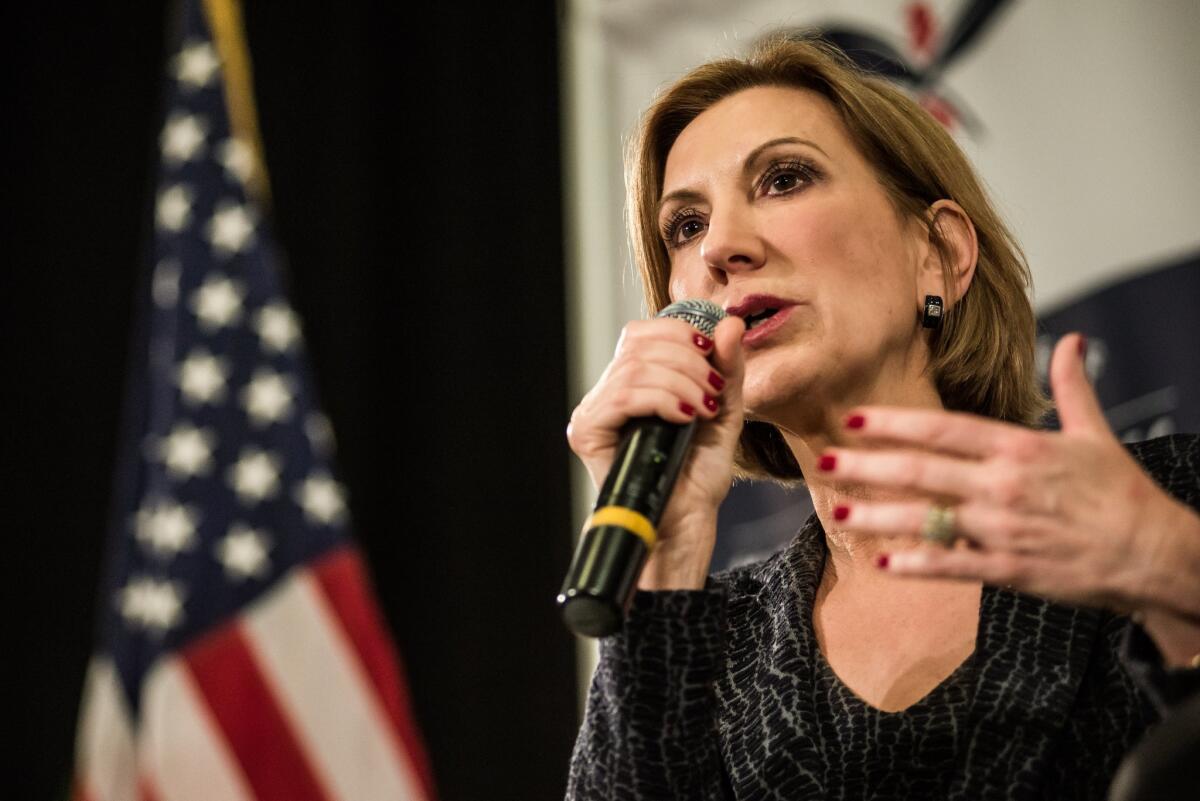
As she rises in the polls, Republican Carly Fiorina’s record has come under closer scrutiny. Some conservative critics have begun questioning the presidential hopeful’s fealty to their principles.
Carly Fiorina's record as chief executive of Hewlett-Packard helped kill her chances in the 2010 U.S. Senate race in California, in which she lost to incumbent Democrat Barbara Boxer in a year when a tea party-buoyed wave swept Republicans into power on Capitol Hill.
Now, as she pursues the presidency, she maintains that she was in the right, that her moves as CEO -- 30,000-plus layoffs, the acquisition of Compaq that decimated HP's stock price -- were acts of decisiveness.
Though she has also softened her approach in some ways, acknowledging the toll of the layoffs at HP, her strategy is still a gamble. Detractors from 2010, from Boxer on down, are eager to reassert their criticisms of Fiorina.
The Times' team of Seema Mehta, Andrea Chang and Mark Z. Barabak explore Fiorina's record at HP and how she's trying to frame her tenure on her terms:
Trump's tax policy: Let the scrutiny begin
The last time Donald Trump laid out a major policy plan, on immigration, his ideas were derided in some quarters as misguided, bizarre, dead on arrival.
No matter.
The release of the plan -- chiefly, mass deportations and a wall along the entire southern border, to be paid for by immigrants' remittances -- marked one more plot point in Trump's ascendance to the top of the polls, as voters hungering for an anti-establishment voice channeled their frustration with the government into support for his candidacy.
Now, as his popularity with voters appears to have edged past its peak, Trump is seeking to maintain the hang-on-his-every-word attention that his campaign won this summer. He's due to issue a tax policy plan Monday, and he promises eye-popping cuts for everyone, whether middle class, lower class, or even corporations. Some people won't even be taxed at all, he says.
Trump also appears to be edging toward the idea of raising taxes on the wealthy, telling "60 Minutes" last night, in somewhat muddled terms, that "some very wealthy are going to be raised. Some people that are getting unfair deductions are going to be raised" and "I don't want to have certain people on Wall Street get away with paying no tax."
Normally, raising taxes would be anathema to Republicans, but Trump is already feuding with the influential conservative group Club for Growth, which leads the anti-tax movement on the right. And such an unorthodox idea fits with his campaign.
What remains to be seen is whether the details of his plan weaken under scrutiny in the way his immigration plan did, or whether his self-proclaimed business acumen will lend expertise to his tax policy.
"Nobody knows the tax code better than me," he said.
While that might be true, businesses get taxed; they don't do the taxing. Another Republican in the field, former Florida Gov. Jeb Bush, was criticized for his own tax policy that he labeled as a growth engine but was found mostly to cater to top earners.
Trump, though, has an answer for most criticisms, as he did when "60 Minutes'" Scott Pelley tried to argue with him during Sunday's show about his plan to deport the 11 million people in the U.S. illegally:
Pelley: "You know, the problem with a lot of these ideas is that the president of the United States is not the CEO of America."
Trump: "That's right."
Pelley: "The Constitution is going to tell you no."
Trump: "We'll see."
Pelley: "The Congress is going to tell you no."
Trump: "We'll see."
Pelley: "The Supreme Court is going to tell you no."
Trump: "Well, we'll see."
We just might.
By the numbers
Sign up for Essential California
The most important California stories and recommendations in your inbox every morning.
You may occasionally receive promotional content from the Los Angeles Times.







